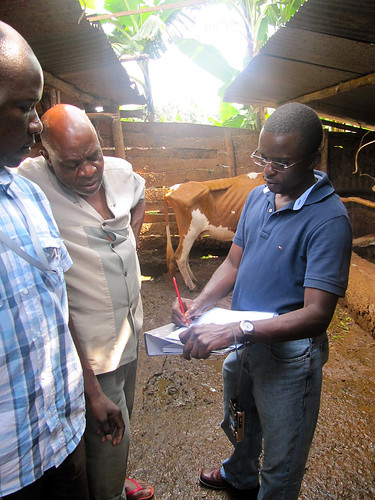Fidalis Mujibi, a geneticist at ILRI, collecting information from a smallholder livestock farmer in Busia, Kenya. Mujibi is one of the winners of the 2013 ‘BREAD Ideas Challenge’ award for an idea to improve livestock breeding services (photo credit: BMGF/Lee Klejtnot).
Fidalis Mujibi, a Kenyan geneticist working with the International Livestock Research Institute (ILRI) in Nairobi, is one of the winners of the 2013 USD10,000 ‘BREAD Ideas Challenge’, announced in July.
The award is given each year by the American National Science Foundation and is part of the ‘Basic Research to Enable Agricultural Development (BREAD) program, which is co-funded by the National Science Foundation and the Bill & Melinda Gates Foundation. This year, the award recognized 13 innovators amongst many applicants ranging from scientists, professors and graduate students from around the world. The winning challenges focused on ideas of solving pressing and largely ignored issues affecting smallholder farming in developing countries.
Mujibi received the award together with American scientist and beef reproductive management specialist George Perry, from South Dakota State University. Their idea is to eliminate the need for liquid nitrogen in livestock artificial insemination services in developing countries.
Liquid nitrogen is needed to preserve the semen used to inseminate dairy cows artificially, but it’s expensive and raises the costs of artificial insemination services for poor farmers in developing countries. Most of those providing artificial insemination services are unable to maintain a steady supply of liquid nitrogen in their tanks, leading to cases of dead semen being used for insemination. This in turn necessitates many repeated insemination procedures, which not only are unduly expensive but also result in long calving intervals, reducing the lifetime productivity of cows.
‘Our idea focuses on alternatives that could eliminate the “cold-chain” from the artificial insemination delivery process’, says Mujibi. ‘We’re exploring ways of delivering semen to remote villages in Africa where there is no infrastructure to support liquid nitrogen systems, so that farmers can access the germplasm they need easily.’
‘I want to explore new ways of helping Africa’s smallholder farmers to improve their livestock production through new germplasm delivery and novel reproductive tools. This will help them better cope with pressures from climate change and reduced farmland,’ says Mujibi.
Mujibi and Perry are preparing a full proposal they will submit to the American National Science Foundation in September.
‘The BREAD challenges range from the global to the local and across diverse disciplines’, said John Wingfield, assistant director for biological sciences at the National Science Foundation. ‘What they have in common is that they represent topics that have not had the attention or funding to prompt a solution. Solving any of these challenges would have a dramatic impact on the lives of millions of smallholder farmers around the globe.’
Read more information about the BREAD award:
http://www.nsf.gov/news/news_summ.jsp?cntn_id=128546&org=NSF&from=news
Find out more about ILRI’s work in livestock genetics
/archives/tag/dairy-genetics-east-africa-project

